|
| NEWS |
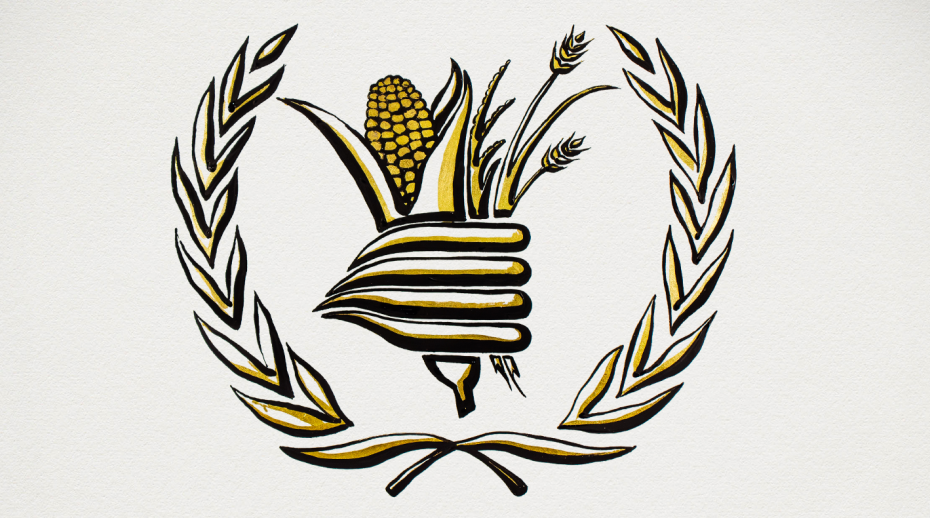 |
| SIPRI statement on the 2020 Nobel Peace Prize |
| SIPRI would like to congratulate the World Food Programme (WFP) on being awarded the 2020 Nobel Peace Prize. ‘I think this is a very well-judged choice. Food security is foundational to human security, and the WFP is out there on the front line in many countries caught up in conflict,’ said Dan Smith, SIPRI Director. ‘The WFP knows that it can and should make an important contribution to the prospects for peace, and it takes understanding how it can do that very seriously—that is what we focus on in the knowledge partnership SIPRI has with them.’ |
|
|
Read more | Watch the SIPRI Spotlight with WFP | Watch the SIPRI–WFP event
|
|
|
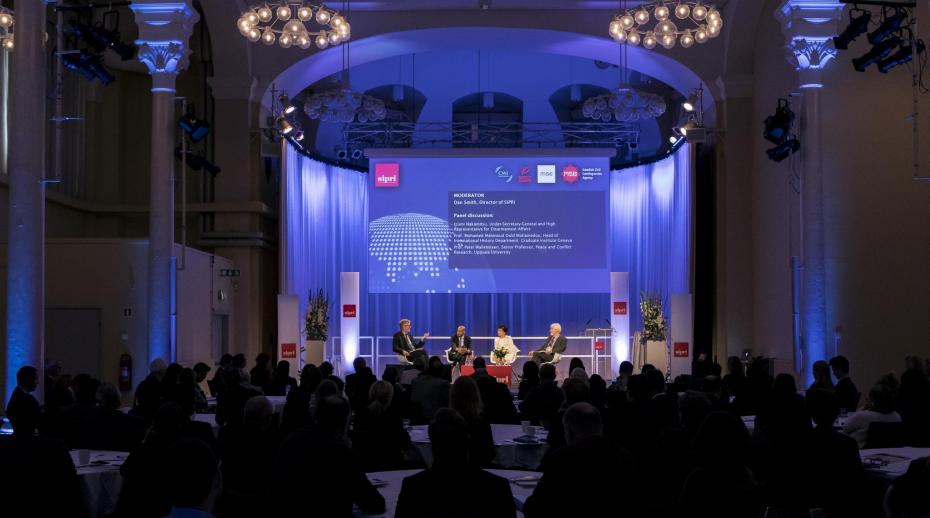 |
2020 Stockholm Security Conference:
Register now |
|
On 17–20 November 2020, SIPRI will host the fifth annual Stockholm Security Conference with the theme, ‘International Cooperation: Navigating the Way Ahead’. High-level Panels on 18 November will explore trends in international cooperation and their implications for the future of international security and multilateralism. Additional sessions will apply this thematic lens to specific contexts including the rise of China; nuclear arms control; and the responsible development of artificial intelligence. In light of COVID-19, the conference will convene in a virtual format. The full conference programme and registration links are now available.
|
|
|
Read more | Read the conference programme and register
|
|
|
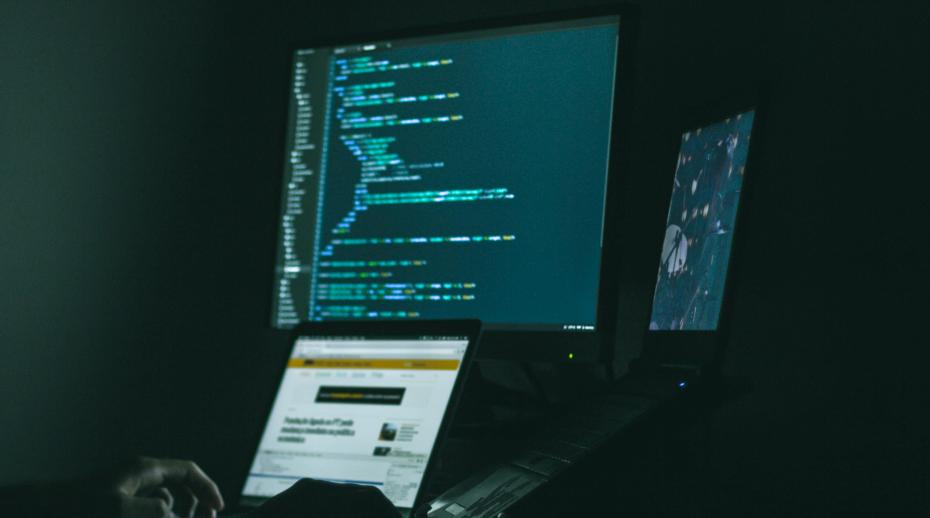 |
| Resilience better than deterrence in managing cyber incidents—new SIPRI report |
|
Cyber incident management strategies should prioritize making systems—and societies—more robust and resilient to a broad range of cyber risks, rather focus narrowly on preventing and responding to cyberattacks, argues a new SIPRI Policy Paper. The study team analysed the responses to nine cyber incidents in Estonia, Finland, Japan, Singapore, South Korea and the United Kingdom. In particular they looked for practical lessons on how states and national crisis-management agencies can prevent cyber incidents from escalating into crises. The report was made possible by the generous financial support and collaboration of the Swedish Civil Contingencies Agency (MSB).
|
|
|
Read more | Download the SIPRI Policy Paper
|
|
|
 |
| 2020 Stockholm Forum on Peace and Development: Summary report |
|
SIPRI is pleased to release a report that summarizes the main findings from the 2020 Stockholm Forum on Peace and Development. The report provides an overview of the three High-level Interactive Dialogues with the key message: crisis does not have to divide us; it can bring us together to solve problems. The report also contains transcripts of statements delivered during the Forum by both Ilwad Elman, Director for Programmes and Development, Elman Peace and Human Rights Centre; and António Guterres, United Nations Secretary-General. SIPRI would like to extend its gratitude to everyone who made the Virtual Forum possible.
|
|
|
Read more | Download the report (PDF)
|
|
|
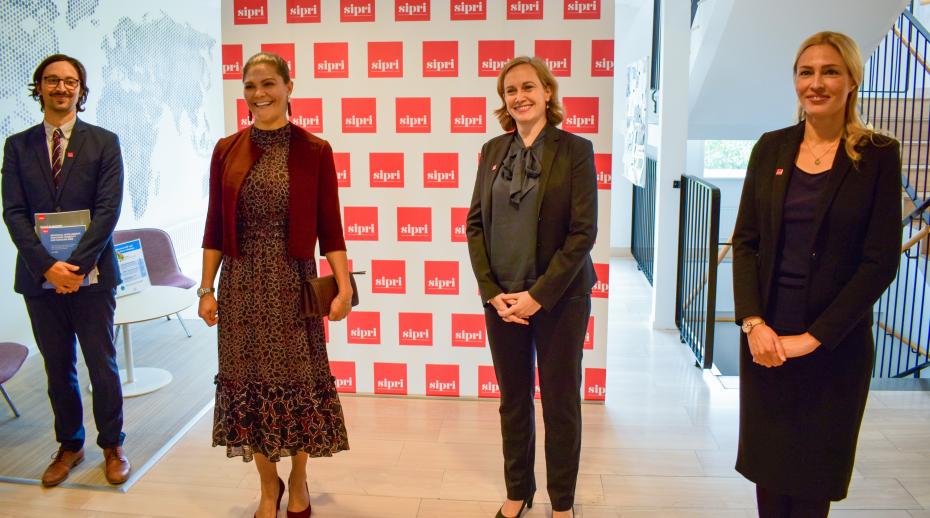 |
| SIPRI hosts Her Royal Highness Crown Princess Victoria |
|
On 1 October 2020, SIPRI was honoured to host a visit from Her Royal Highness Crown Princess Victoria. During the visit, the Crown Princess engaged in a roundtable discussion with SIPRI experts on topics related to artificial intelligence and its impact on international peace and security, as well as on the current state of arms control. The discussion also focused on the challenges posed by the ongoing COVID-19 crisis, in particular how resilience can be strengthened to confront future challenges, such as those posed by violence and epidemics.
|
|
|
Read more
|
|
|
|
| COMMENTARY |
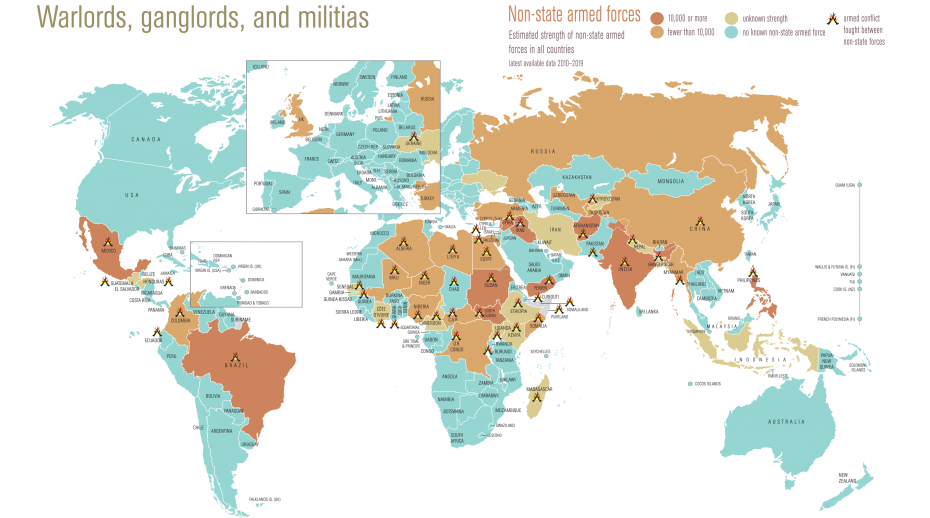 |
| A breakdown in cooperation puts us all at risk |
|
In this SIPRI Essay, Dan Smith, SIPRI Director, gives an overview of trends identified in his recent project: the 10th edition of The State of the World Atlas. The Essay outlines the threat that the breakdown in international cooperation poses to current and future challenges. Critical issues such as climate change and offshore financing are effectively borderless and can only be solved through comprehensive international cooperation. The Essay argues that bolstering cooperation will offer tangible benefits to peace, prosperity and progress.
|
|
Read the SIPRI Essay | Watch the Peace Points episode | Purchase The State of the World Atlas (use discount code: STATEOFTHEWORLD for 20 per cent off)
|
|
|
 |
| Russia’s nuclear doctrine moves the focus from non-Western threats |
| In June 2020 Russia made its nuclear doctrine more transparent in terms of why, when and how it would use nuclear weapons. Without naming potential adversaries, Russia is now more explicit about the regional scenarios that could lead to nuclear warfare. It seems to have confirmed that its updated nuclear doctrine is less focused on East Asia, South Asia and the Middle East. At the same time, Russia continues to reserve the right to use nuclear weapons to end conventional military conflicts. In this WritePeace blog, Dr Petr Topychkanov, Senior Researcher, explores what has changed in Russia’s new nuclear doctrine and what the changes signal. |
|
Read the WritePeace blog
|
|
 |
| Escalating violence in Nagorno-Karabakh: Local solutions offer the main hope |
|
In this Expert Comment, Dr Ian Anthony, Director of SIPRI’s European Security Programme, analyses the ongoing conflict in the Nagorno-Karabakh region of Azerbaijan. While details remain scarce, the fighting appears to be more intense than the skirmishes that killed at least a dozen people in the summer of 2020. The Expert Comment maintains that a focus on commonly agreed risks and threats, which can be tackled technically without identity-based impediments, could engage grassroots actors in regional networks and platforms. Over time this approach could help to unlock diplomatic activities.
|
|
Read the Expert Comment
|
|
|
| UPCOMING EVENTS |
| |
| 17–20 November 2020 |
| 2020 Stockholm Security Conference |
|
On 17–20 November 2020, SIPRI will host the fifth annual Stockholm Security Conference. The theme of this year’s conference is ‘International Cooperation: Navigating the Way Ahead’. The conference will explore trends in international cooperation and their implications for the future of international security and multilateralism. The full conference programme and registration links are now available.
|
|
Read more | Read the conference programme and register
|
|
|
| RECENT EVENTS |
| |
| 15 October 2020 |
| Crisis, conflict and climate: From immediate humanitarian response to longer-term peace and development solutions |
|
On 15 October, SIPRI co-hosted a virtual event on ‘Crisis, Conflict and Climate: From immediate humanitarian response to longer-term peace and development solutions’. The discussions highlighted key challenges and the work of actors to promote integrated and inclusive responses to climate action and sustaining peace across the humanitarian–development–peacebuilding nexus. The webinar was co-chaired by SIPRI, the UN Development Programme, the Swedish Ministry for Foreign Affairs, the WFP and the Elman Peace and Human Rights Center.
|
|
Read more
|
|
|
| PUBLICATIONS |
 |
| Protest and State–Society Relations in the Middle East and North Africa |
| Nearly a decade after the Arab Spring, the substantial political change that many across the Middle East and North Africa (MENA) have hoped for has yet to be seen. This paper takes a regional approach to understanding the state of the social contract in MENA countries. It describes, country-by-country, the impact of protest movements, or their absence, on relations between society and the state. Based on this, the authors recommend that the European Union (EU) adopts a new approach to regional security and stability that takes the needs of the populations as the starting point. |
|
Read the SIPRI Policy Paper
|
|
|
 |
| A Technical Retrospective of the Former South African Nuclear Weapon Programme |
| Much has been written about South Africa’s nuclear weapon programme. But none of it has previously drawn on the knowledge and skills of a US nuclear weapon engineer who examined in person the technical aspects of the programme. That engineer—Robert Kelley—has now given a detailed account of how engineers, physicists, policymakers and the military worked on the programme—often at cross purposes and without coordination. Kelley shows how internal competition and an inability to execute the task on time prompted the government to give up its nuclear weapons. |
|
Read the volume
|
|
|
 |
| Transparency in Arms Procurement: Limitations and Opportunities for Assessing Global Armament Developments |
| With the aim of confidence building, states have agreed to share information on their arms procurement and military expenditure in several multilateral transparency instruments. However, this SIPRI Insights on Peace and Security paper shows that, in recent years, participation in these instruments has declined to a very low level and that the information provided is not always comprehensive. The paper reveals that many states have readily available information on arms procurement and military spending at the national level that could be submitted to the multilateral reporting instruments, which could help to revitalize them. |
|
Read the SIPRI Insights on Peace and Security
|
|
|
 |
| Understanding Egyptian Military Expenditure |
| This SIPRI Background Paper provides an in-depth exploration of the official military spending figures for Egypt. Through analysis of primary and secondary sources, it highlights gaps and shortcomings in the data reported by the Egyptian Government. By mapping and examining a comprehensive list of Egypt’s arms procurement deals between 2000 and 2019, it also shows that the growing number of arms acquisitions apparently had no impact on the level of military spending officially reported by Egypt over the most recent decade. |
|
Read the SIPRI Background Paper
|
|
|
 |
| Cyber-incident Management: Identifying and Dealing with the Risk of Escalation |
| This SIPRI Policy Paper is the result of a nine-month research project that was jointly conducted by SIPRI and MSB on cyber-incident management. The paper explores what national crisis management authorities can do to improve their cyber-incident prevention, detection and response strategies and also how they can do better to deal with the larger societal and potentially political aftermath. It also investigates why and how cyber incidents may lead to escalatory scenarios and how these scenarios can be avoided and contained using various de-escalatory approaches. |
|
Read the SIPRI Policy Paper
|
|
|
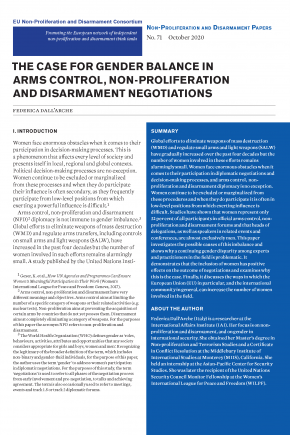 |
| The Case for Gender Balance in Arms Control, Non-proliferation and Disarmament Negotiations |
| Global efforts to eliminate weapons of mass destruction and regulate small arms and light weapons have gradually increased over the past four decades but the number of women involved in these efforts remains alarmingly small. This paper investigates the possible causes of this imbalance and shows why a continuing gender disparity among experts and practitioners in the field is problematic. It demonstrates that the inclusion of women has positive effects on the outcome of negotiations and examines why this is the case. |
|
Read the EU Non-Proliferation and Disarmament Paper
|
|
|
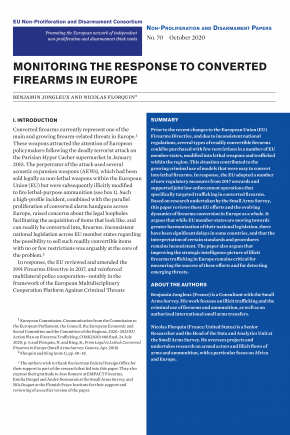 |
| Monitoring the Response to Converted Firearms in Europe |
| Based on research undertaken by the Small Arms Survey, this paper reviews recent changes to the EU Firearms Directive and the evolving dynamics of firearms conversion in Europe as a whole. It argues that while EU member states are moving towards greater harmonization of their national legislation, there have been significant delays in some countries, and that the interpretation of certain standards and procedures remains inconsistent. The paper also argues that improving the strategic intelligence picture of illicit firearms trafficking in Europe remains critical for measuring the success of these efforts and for detecting emerging threats. |
|
Read the EU Non-Proliferation and Disarmament Paper
|
|
|
 |
| Mapping Non-proliferation and Disarmament Education in Europe |
| This paper maps activities undertaken to educate the next generation of Europeans on non-proliferation and disarmament-related topics with a view to training future scholars and professionals, excluding capacity-building efforts. The geographic distribution and dominant political science focus of these efforts illustrate the lack of accessibility and multidisciplinarity of non-proliferation and disarmament education currently available in Europe. Treating education as empowerment rather than a one-way process of recruitment can facilitate the introduction of new approaches and tools. |
|
Read the EU Non-Proliferation and Disarmament Paper
|
|
|
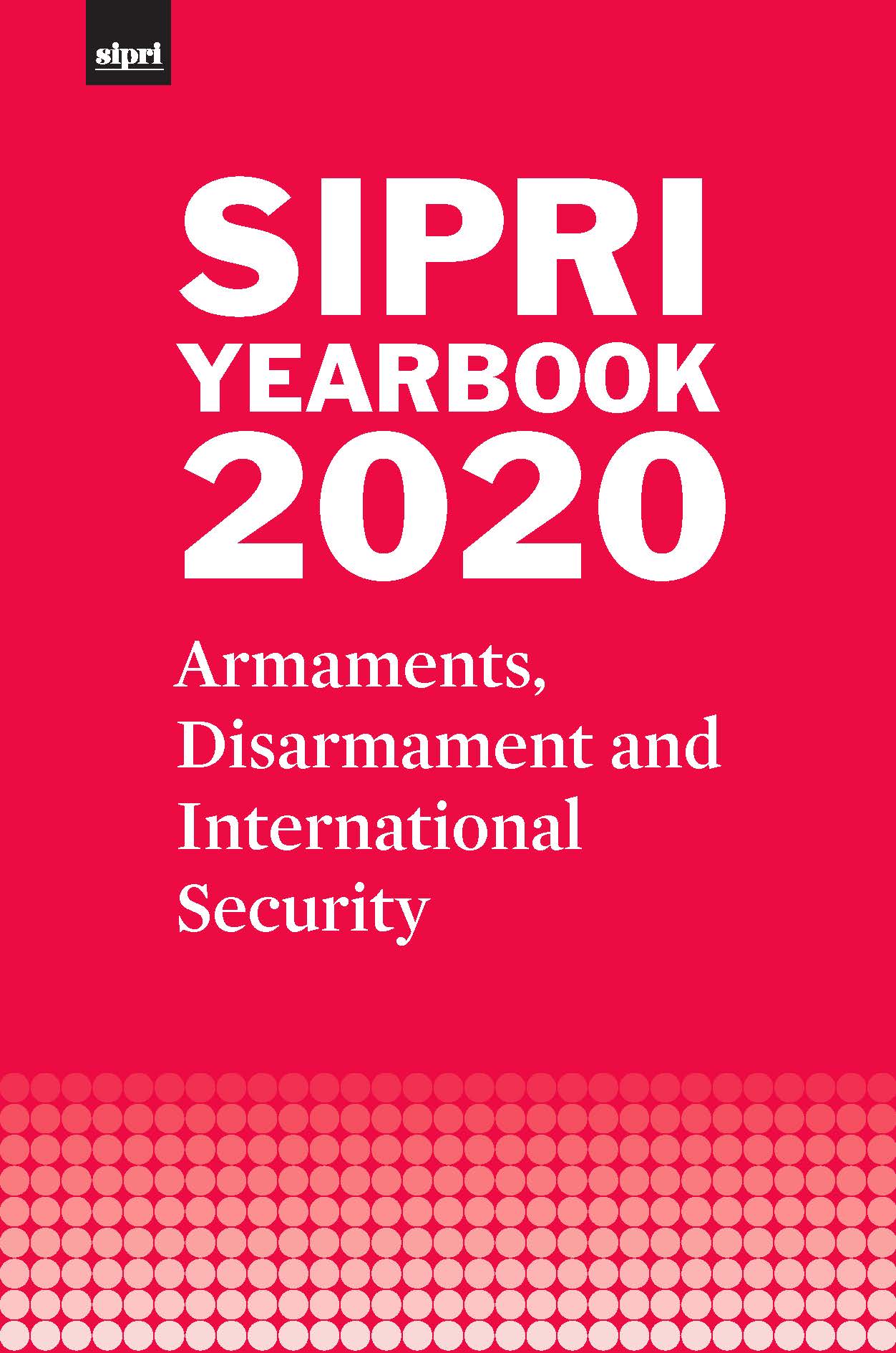 |
| SIPRI Yearbook 2020 |
SIPRI Yearbook 2020 presents a combination of original data in areas such as world military expenditure, international arms transfers, arms production, nuclear forces, armed conflicts and multilateral peace operations with state-of-the-art analysis of important aspects of arms control, peace and international security. It covers developments during 2019, including:
- the state of nuclear arms control;
- transparency in military spending;
- regional overviews of armed conflicts; and
- the investigation of allegations of chemical weapon use in Syria.
|
|
Browse the contents page | Download the summary (PDF) | Order SIPRI Yearbook 2020
|
|
|
| |
|
|
|